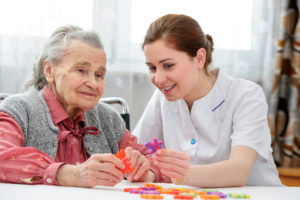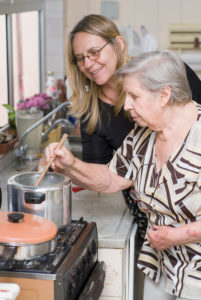When a loved one has Alzheimer’s or Dementia, interaction may be more difficult than it was before. You may struggle to understand their mindset and thought process or be unsure of how to diffuse potentially problematic situations. Fortunately, there are several things you can do to comfort people in your life with dementia and smooth the care process. 1. Empathize Actively If a loved one has Dementia, they may become easily confused by what is happening around them. They may not be sure of the time period in which they are living or who is with them. You may not be able to restore their ability to understand what’s going on. However, arguing with them will just frustrate everyone involved! By empathizing actively and trying to understand what they’re going through, on the other hand, you can remove many of the barriers and make it easier to deal with a difficult situation. 2. Interact in a Positive Way When a loved one or an individual under your care has Dementia, it’s easy to slip into the habit of acting like the parent. Treating them like a child, however, can undermine their sense of self-worth and leave them feeling more off-balance than before! Instead, try to interact in a respectful and positive way. Take the time to listen to their opinions and adapt to them when possible. 3. Break Activities Into Steps When you’re dealing with Alzheimer’s or dementia, it’s important to break down regular activities into smaller steps to make them more manageable. This can be everything from taking a walk to getting ready for the day. Breaking down tasks into a series of smaller tasks makes them more approachable and manageable for an individual with Alzheimer’s or dementia. When you break down the tasks ahead of you, you can tackle each small one at a time. This can also make it easier for dementia sufferers to focus on the task currently at hand, rather than getting overwhelmed with the entire process which may cause them to get agitated and shut down completely. 4. Recall Good Memories Recalling the “good old days” is often soothing and comforting for someone suffering from dementia. Take the time to talk about old and/or positive memories. Look through pictures together. Ask questions and genuinely listen to what they have to say. You’ll discover that looking back on old memories isn’t just a great way to calm them; it’s also an excellent bonding opportunity that can help both of you actively remember happier times as you continue to build a relationship. 5. Deliver Your Message Clearly Speaking to someone with dementia can be incredibly frustrating, especially if you feel they aren’t able to absorb the message you’re trying to give them. When you’re struggling to communicate, try using short, clear sentences and simple, one-step instructions. Be careful not to slip into the habit of talking to your loved one like a child, but provide them with the information they need in an easy-to-understand manner to make it easier for both of you to communicate. You don’t have to use the patronizing method of speaking loudly and slowly to the elderly, which will undermine their sense of self-worth; do, however, slow down and take the time to break down what you have to say in a way that can be easily understood. Caring for a loved one with Alzheimer’s or dementia can be a difficult process. When you follow these five simple methods, however, you can break down communication barriers and make it easier to interact. Of course, remember that our Elderlink Home Care, Inc. team has over 30 years of experience providing Alzheimer’s and dementia support. If you are struggling or feeling overwhelmed, our caregivers can help! Call us today, at (303) 734-0641 or contact us via our website to learn how we can help!
Make an Appoinment
Jennifer Moorehead | Elderlink Home Care - Part 15
As your parents age, it may be more difficult for them to take care of daily tasks and responsibilities. Simple self-care becomes more challenging and taking care of tasks around the house may be more daunting than it’s ever been before. Simply charging in and taking over, however, won’t help you or your aging loved one. Not only will it add a heavy dose of responsibility to your shoulders, it may be hard on your parent’s self-esteem or feelings of independence. By learning how to balance those key tasks, you can improve your interactions with your parent while ensuring they get the care they need. 1. Let Them Lead For many years, your parent was responsible for taking care of themselves–and for taking care of you! As they age, they still need to lead the self-care process as much as possible. It may take longer to wait patiently for your parent to complete a task when they’re the one leading the way, but providing them with that extra independence can help improve their self-esteem and make them feel more capable even as their physical abilities deteriorate. 2. Ensure Their Health After hospital stays or a new medical diagnosis, your aging loved one may need more care than before. Take care to monitor medication to ensure that they’re taking it properly, especially if forgetfulness is setting in. It may also be helpful to attend doctor’s appointments with them, particularly after a new diagnosis or injury. 3.Address Emotional Needs, Too It’s easy, as an adult child, to get caught up in your parent’s physical needs. There are so many things to take care of, especially when you’re balancing the need to keep up with their needs as well as your own. It’s important, however, to keep an eye on emotional needs as well as physical ones. Take the time to sit down and have a genuine conversation. Exchange kind words. Make sure to evaluate your parent’s emotional state and take action if they seem to become depressed or anxious. These simple steps can have a big impact on your loved one over time! 4. Remain Respectful Your parent has not become a child in spite of the fact that they now need your help and care. When interacting with your parent, be respectful! Keep in mind that they still have the right to make their own choices, and you should ask for their opinion before making a choice for them. Take the time to think through how your actions will impact them, especially if you’re making decisions that may reduce their independence. 5. Prepare the Home You’re well aware that certain hazards increase as your loved one ages. Keep an eye on potential fall hazards and problems in the kitchen, bathrooms and around the rest of the house. You don’t want to sweep in and take over, but you do want to be sure that the home is as safe as possible! Take the time to remove cords and unnecessary clutter from common areas. When necessary, install grab bars in the bathroom to help your loved one keep their balance. As you take these simple steps, you’ll help ensure your loved one’s safety. Providing care for an aging parent or loved one can be a struggle, but doing so respectfully and lovingly is well worth the effort. Remember, our Elderlink Home Care, Inc. team has over 30 years of experience helping our clients age gracefully and comfortably in their own homes. If you are struggling or need help, we are ready to lend a helping hand. Call us on (303) 734-0641 today to learn how we can help provide the care your loved one needs.
As we age one of our great fears is the loss or significant decrease of our mental faculties. Our mind is one of our great assets as human beings. However, getting older does not have to signal the loss of mental capabilities. They are plenty of ways to stay sharp over the years. Just because your body is not as active as it used to be does not mean that your mind also has to follow suit! Here are some great ways to keep your mind sharp! 1. Stimulation The mind is very much like a muscle in a lot of respects. In one aspect, the more you work it out and stimulate it, the healthier and more active it will be. Research indicates that keeping your mind moving (stimulated) helps promote neural activity, can create new connections between nerve cells and even help generate new cells which can combat the loss of cells due to aging. Some great ways to work out your brain is to read books, stories, news articles, etc., play word games and other puzzles such as Sudoku or crosswords. Also, engage in activities that require your mind and body to work as one (activities that are great are the arts such as painting, playing music, etc.). 2. Exercise Physical exercise is not only great for your body, but it is also great for your mind! Research shows that regular exercise increases the amount of tiny blood vessels carrying oxygen laden blood to the parts of the brain that promote thought. Besides promoting more thought, exercise also promotes cellular growth of nerves and increased connections between the brain’s synapses. With exercise, comes lower blood pressure, cholesterol, stress and a host of other health benefits that are not only beneficial for an aging heart, but also an aging mind. 3. Socialization Having friends, a sense of community and socialization is great for morale and your overall quality of life. However, new research has shown that people who maintain a large group of friends or socialize regularly decrease their risk of dementia. The feeling of loneliness has been linked to mental decline as we age. Part of a balanced, healthy life is regular socialization. Going out and making friends is a great way to stay young in more ways than one! 4. Writing Stimulating your brain can also be achieved by writing. Writing (even non-fiction) makes your brain stronger. The connections you make and create on paper help stimulate neural activity. As we’ve already discussed, the more active a brain is, the healthier it will be. Writing is a great way to really strengthen your brain and engage creative and critical thinking. 5. Sleep The proper amount of rest is one of the most crucial aspects of maintaining a healthy brain. This is especially true as we age. The proper amount of sleep not only boosts your overall mood and sharpens your memory, but it also ensures that you are more alert and focused and ready to take on daily tasks and challenges. 6. Proper Diet Taking care of your body is more than just getting enough sleep and exercising your mind and body. A large component to our overall health, especially as it pertains to the brain, is eating a proper, balanced diet. Not only does a poor diet put more stress on your body, but it also puts more stress on your mind, which makes stimulating brain health or development difficult. 7. Quit Smoking and Drinking Smoking and drinking are bad for your health; we all know this, but they are also bad for your brain. Smoking leads to the build-up of plaque in your arteries, which increases your risk of stroke and it makes it harder for your heart to pump blood, which puts strain and stress on it, which puts stress on your brain. Drinking, on the other hand, has been shown to decrease cognitive abilities over the years and seriously affect memory alongside a host of other liver and heart related health concerns. Please contact us to learn more about the home care services we provide.
Elderlink Home Care, Inc. is very excited to announce the winner of our ‘Celebrating 30 Years’ grant for May, 2018, Claudia Hill. Mrs. Hill was nominated by her very close friend of 30 years, Nancy Stroud (pictured above with Claudia). Claudia, 83, has lived here in Colorado her entire life and really loves it here! The earlier years of her life were spent raising her 3 sons and working in a variety of different fields including teaching and real estate! She has 10 grandchildren. Mrs. Hill and her husband, Michael, love to travel and did a lot of it prior to his Alzheimer’s diagnosis 5 years ago. Her favorite place she has visited is Spain. One of her sons also lived there for work for a period of time. Michael is currently living in New Dawn Memory Care, where Claudia is able to visit him often. When asked what her plans were for her $300 grant award, she stated she would really like to ‘pay it forward’ and donate some games, activities, or other supplies to New Dawn Memory Care and help enrich the lives of the residents there, which we think is so gracious of her! Congratulations Mrs. Claudia Hill! We are so happy to present you with this $300 grant.
As you get older, you’ll have plenty of struggles along the way. Many of the common signs and symptoms you often associate with aging, however, may not be as severe as you think! By combating the myths of aging, you’ll discover that you can live a full, healthy lifestyle throughout your important golden years! Myth #1: Your Brain Deteriorates Over Time Sure, as you age, you may naturally struggle more to remember simple things, and it may be harder to grasp new concepts–but that doesn’t have to be the case. Your brain is capable of developing new connections and learning and understanding new concepts. Make sure that you’re conducting proper brain activities on a regular basis to help improve your continued processing ability. Play brain games, learn how to do new things, and embrace the opportunity to grow your mind. Myth #2: Older People Don’t Need Close Relationships The need for community and connection doesn’t go away as you age. Older people need close relationships just as much as younger ones–and it’s important that you take the time to develop them. Take a class, attend an activity or club on a regular basis, and look for other ways to connect with people. Develop friendships. If you’re feeling lonely, check out a local senior center or become involved with a local senior group. Relationships can help keep your mind sharp and improve your overall health–and that’s well worth investing in. Myth #3: You’ll Become Frail as You Age While frailty comes with age for many individuals, you don’t have to give in and assume you’re going to be frail and breakable just because of the number of candles on your cake! Instead, work with a trainer to develop an exercise routine that will help keep you strong and flexible. Proper nutrition and vitamins can also help keep your bones strong even as aging tries to threaten them. Also, be sure to visit your doctor on a regular basis. The longer you stay active in your senior years, the longer you’ll be able to stay active and the more you’ll be able to do and enjoy! Myth #4: Aging Makes You Less Creative During your senior years, you have more time on your hands to explore all of the creative gifts you may have let slide by the wayside when you were younger. Many people find that, with free time to use to full advantage, they’re able to be more creative through their senior years than they ever were when they were young. Pick up a new hobby or embrace the ones that you had to ignore due to the demands of raising a family or working full-time. You may be surprised by just how much you’re able to accomplish–and by how much you enjoy it! Myth #5: Your Genes Determine How You Age While your genes may have some impact on how well you’re able to age, it’s your lifestyle that really impacts the aging process. When you choose to stay active, eat healthy, and keep your brain sharp, you’ll discover that you’re in a better position to age well and gracefully. Ditching bad habits like alcohol and tobacco consumption as young as possible can also help decrease the signs and symptoms of aging so that you’re able to better enjoy your senior years. You don’t have a choice about getting older, but there are many things you can do to help increase your odds of growing older with grace. By combating the myths of aging, you’ll discover that you can live a full, healthy lifestyle well into your retirement years, enjoying everything going on around you. Do you or a loved one need more help to live the full lifestyle you want? Contact us to learn more about we can help you or a loved one reach your goals.
Aging isn’t always fun. As you age, there some changes that are inevitable and in fact natural. While they may feel worrisome, especially as you figure out how to deal with those symptoms, you shouldn’t worry too much when key signs of aging begin to arise. By becoming aware of the differences in your body as you age, you can continue aging with grace, saving your worry for potentially dangerous symptoms. Sign #1: Decreasing Strength and Stamina As you age, it’s natural to no longer have the energy and strength you had when you were young. You may find that you’re not able to accomplish some of the same things you did when you were younger or that it’s harder to get through those extremely busy, draining days. It’s more important than ever to keep up a good exercise routine as you age. This can help improve both strength and stamina and keep you feeling younger longer. Sign #2: Skin Changes As you get older, you will most likely notice your skin will change. It will become thinner and more fragile, which means that it will tear and bruise more easily. You may find that you have more problems with injuries or even that you have unexplained bruises that you don’t recognize or remember. Age spots, which are natural darkening of the pigments of the skin in some areas, may also start to appear. While you’ll want to be more careful about bumps and dings, thinning skin isn’t a sign of trouble. It’s a perfectly normal sign of aging. Sign #3: Sleep Changes As you get older, your need for sleep will change–and it’s not always predictable! Some people may find they need more sleep as they get older. This may mean a nap in the middle of the day or sleeping later in the morning. Others find that they simply don’t need as much sleep or that it’s harder to fall asleep at night. By establishing a routine and getting your circadian rhythms set so that your body knows when it’s expected to sleep, you can continue to get the amount of sleep that’s right for you. This will help you feel well-rested and ready to tackle your day. Sign #4: Loss of Taste Many of the symptoms of aging aren’t fun, but losing or decreasing your sense of taste can be a real struggle! As you age, the intensity of taste may decrease. This may mean that some of your favorite foods no longer have the rich flavors that you’re used to enjoying or that you may start to like foods that weren’t appealing in the past. Hot and spicy foods, for example, may seem to have a more appropriate flavor punch. Many seniors also start to develop an increasing sweet tooth as they age. Sign #5: Aging Eyesight It’s natural for your eyesight to decline with age. You might notice that it’s harder to see at night or that you struggle to see small print when it’s right in front of you. Your depth perception and ability to judge colors may also begin to decrease. If you notice that you have blind spots in your vision or that there seems to be a haze over everything, on the other hand, it’s time to pay a fast visit to your eye doctor to discuss your symptoms. Learning to cope with the signs and symptoms of aging can be a challenge. If you need additional help adjusting to these changes or taking care of the daily tasks that improve your quality of life, contact us! We’ll work with you to maintain the independence you desire!
Vision loss is difficult for seniors. As the years go by, they may start to lose the ability to do the things they’ve always done, simply because they can’t see well enough to do those activities. The most common causes of poor eyesight in elderly adults are macular degeneration, diabetic retinopathy, cataract and glaucoma; however, no matter the reason, the result can be the same: feelings of frustration and depression due to decreased independence. Fortunately, there are ways for you and your elderly loved one’s caregiver to ease this challenge. Use these five techniques to help your loved one navigate the world with greater ease and comfort despite a loss of vision. Face Them While You’re Speaking Facing a senior with vision loss helps them hear you more clearly and identify where you are in the room. Listen attentively and offer verbal cues to indicate your involvement in the conversation. You’ll also want to be clear about ending a conversation or leaving the room, so the person doesn’t keep talking while you’re not there to listen. Let Them Set the Pace While walking with a vision-impaired senior, match their pace to avoid accidentally pushing or pulling. It can be difficult for the elderly to maintain balance, anyway; with poor eyesight this becomes even more challenging. If you accidentally encourage them to move a step too fast or too slow, it can disrupt their balance and cause a fall; it may also cause anxiety if they are placing their feet before they feel comfortable and ready for each step. Explain Loud Noises We may hear a strange noise and see a dog across the street; we know the dog was barking or howling. However, sometimes a bark doesn’t sound like a bark at all, especially if you don’t have the visual cue to know where the sound came from. Screeching tires, backfiring cars, animal noises, and falling objects can be difficult to identify without seeing where the sounds originated. Without that visual context, the sounds can be alarming or even frightening. Therefore, it’s helpful if you simply explain the noises: “Wow, that’s a big dog! He looks like a bear” or “Those construction workers just knocked down an entire wall!” gives context to the sudden noise. Describe What’s Happening Every moment is full of little pleasures, and your elderly loved one may miss a lot of them if they can’t see them. Take some time to talk about what you’re seeing in front of you. If you’re at an event, like a graduation, this might mean a little play-by-play of what’s happening on stage and how your graduate looks in his gown. If you’re walking down the street, you might like to point out a unique car, an especially beautiful house or landscaped yard, or the kids who are skateboarding in the park. Let Them Hold Your Arm Even a small degree of vision loss can dampen his confidence about getting around safely. While walking with your loved one, hold their arm or allow them to hold yours so you can help guide them. Not only will this improve their confidence (they know you won’t run into anything!), it also helps them feel more stable and balanced. If you need help caring for an elderly loved one with poor eyesight, we’re here for you. Elderlink Home Care, Inc. has served the Denver area for 30 years with a commitment to high-quality home care. Our compassionate staff is dedicated to creating a high quality of life for your senior in the comfort of his or her home. For more information about Elderlink Home Care, Inc.’s services, contact us. We’ll work with you to develop the right care plan for your loved one.
People cannot always tell the difference between delirium and dementia. Although both conditions can cause cognitive confusion and lead to emotional distress for a senior, there are some differences family members and caregivers should be aware of so the senior can receive appropriate care and treatment. What Is Delirium? Delirium is an abrupt change in the brain that causes confusion. This condition may come and go and is generally temporary and reversible. This is one of the key differences between delirium and dementia: “Delirium is also unique for its severe disorganized thought. This usually leads to a period of inattention or distraction, making the individual unable to focus on tasks. Dementia also features a poor level of focus and concentration, however, the difference is that delirium’s lack of focus stems from rapidly processed thoughts,rather than the stifled ability to conduct thought.” Delirium occurs when the brain doesn’t get enough oxygen or other nutrients, which can be caused by a variety of factors. The biggest one is chronic disease; in fact, dementia itself can cause delirium. Other causes of delirium may include: Alcohol or Drug Abuse and Withdrawal Bacterial Infections, like Urinary Tract Infections or Pneumonia Certain Prescription Medications Surgery and Procedures Requiring Anesthesia Severe Emotional Distress High Fever Sleep Deprivation Dehydration What Is Dementia? Dementia is cognitive impairment that worsens over time, caused by damage to the brain. As the Alzheimer’s Association points out, “Dementia is not a specific disease. It’s an overall term that describes a group of symptoms associated with a decline in memory or other thinking skills severe enough to reduce a person’s ability to perform everyday activities.” The most common type of dementia is Alzheimer’s; the second most common type develops after a stroke, which is known as vascular dementia. Dementia can also be caused by a head injury or trauma, a brain tumor or even a vitamin deficiency, although such a deficiency represents a type of dementia that can often be improved when the cause is recognized and treated. Recognizing the Difference Between Delirium and Dementia Delirium and dementia have many similar symptoms: Difficulty focusing and solving problems Irritability Aggressiveness Memory loss and trouble forming new memories However, it’s essential to recognize the difference. Certain medications that may be used for dementia could actually make delirium worse; in other cases, failing to recognize delirium might mean the senior doesn’t get the care that would help ease or reverse the condition. Here are three key points to help you identify the difference between delirium and dementia: Delirium comes with an inability to focus on a task; a patient with dementia is confused because of an inability to process thoughts. The Alzheimer’s Association says the hallmark of delirium is inattention. Delirium is generally intense and short-lived; dementia is a gradual decline and you will tend to notice symptoms worsening over time. Delirium can generally be reversed if the cause is recognized and corrected; dementia generally cannot. How Elderlink Home Care, Inc. Can Help You If you have a loved one suffering from dementia or Alzheimer’s, Elderlink may be able to help! Elderlink Home Care, Inc. has served the Denver community for 30 years with a stellar reputation and thousands of satisfied clients. We take great pride in our knowledgeable, compassionate staff and our commitment to high-quality care. For more information about Elderlink Home Care’s services, contact us today. We’ll work with you to identify the best strategy to get your loved one the care he or she needs.
Do you have any family members or clients who suffer from dementia? Are you a caregiver looking for positive movies for your client to watch? Surveys completed by caregivers show that clients with dementia are often in more positive moods and more communicative after watching a positive movie. If you’re searching for an uplifting movie to watch with your parent or client, here are 5 of the best movies for dementia patients: It’s a Wonderful Life Director: Frank Capra Date of the first release: January 7, 1947 Main characters: George Bailey, Mary Hatch, Mr. Potter, Uncle Billy, Clarence, and Mrs. Bailey Summary: In this timeless classic, a gentle and kind angel, Clarence, is sent to earth to show discouraged businessman, George Bailey, what life would have been like had George never been born. While this film is associated with the Christmas season, it is a joy to watch any time of year. Cheaper by the Dozen Director: Walter Lang Date of the first release: April 1950 Main characters: Frank Bunker Gilbreth, Ann Gilbreth, Mrs. Lillian Gilbreth, Deborah Lancaster, Ernestine Gilbreth Summary: This movie is based on the real-life story of the Gilbreth family. The movie highlights the amusing challenges of large families. Frank Bunker Gilbreth was considered a pioneer in the study of motion and used his family to test his theories, resulting in embarrassing and funny situations. Grumpy Old Men Director: Donald Petrie Date of the first release: December 25, 1993 Main characters: John Gustafson, Max Goldman, Ariel Truax, Grandpa Gustafson Summary: Two elderly men, John and Max, have been neighbors for over 50 years. Constantly arguing and trading insults, the two become infatuated and competitive over new neighbor Ariel. A warm and funny story about life-long relationships. Singin’ in the Rain Director: Stanley Donen, Gene Kelly Date of the first release: April 11, 1952 Main characters: Don Lockwood, Cosmo Brown, Kathy Seldon, Lina Lamont, Summary: Singin’ in the Rain is set in 1927 when silent films started transitioning to films with sound. The storyline is based on the challenges Don Lockwood and Lina Lamont face as Lina finds her voice isn’t suitable for talking movies. Enter Kathy Seldon who has a great voice but lacks the talent of Lina. Sing along with the familiar theme song while watching the amazing dancing of Gene Kelly. The Sound of Music Director: Robert Wise Date of the first release: March 29, 1965 Main characters: Maria, Captain Von Trapp, the Baroness, Max Detweiler, Mother Abbess, the Von Trapp children Summary: Maria leaves a convent to become a governess to widower Captain Von Trapp’s seven mischievous children. Although she faces hostility at first, Maria soon wins over both the children and Captain Von Trapp. Enjoy beautiful songs such as My Favorite Things, Do-Re-Mi, and Climb Ev’ry Mountain. The Importance of Happy Endings The best movies for people with dementia are movies with happy endings. Comedy, music and an engaging storyline contribute to creating a positive experience. The famous saying that “laughter is the best medicine” is true no matter your age. Planning a movie date at home with your parent or client is a great way for both of you to unwind and enjoy classic entertainment. It is important to have care you can trust when it comes to caring for your senior loved one. Elderlink Home Care, Inc. has served the Denver area for over 30 years and have helped thousands of satisfied clients. They take great pride in their knowledgeable, compassionate staff and their commitment to quality care. For more information about Elderlink Home Care, Inc’s services, contact us today.
Taking care of our aging loved ones or clients is very fulfilling. It is rewarding to give back to the generations that has cared for and paved the way for us. Realistically however, particularly if you are caring for a loved one, it can be easy to neglect yourself and your own needs. To continue providing your loved one or client with the support they need, it’s wise to assess your own well-being from time to time. To help you do that, here are 5 warning signs that you might be experiencing caregiver burnout. You feel exhausted even after a good night’s sleep. Of course, you might not feel like you can run a marathon each day. But you should feel like you have gotten adequate rest to physically and mentally carry out the day’s activities. Exhaustion might seem to be a ‘normal’ part of the life of a caregiver. But it definitely does not have to be. You get sick easily. An immune system functions well when the body gets sufficient rest, good nutrition and other forms of proper care. If you are catching colds or facing other types of illnesses frequently, it could be a sign that you are overextending yourself. It becomes hard to experience feelings of joy or excitement. Caring for a loved one is a gratifying experience. But over time, that joy and contentment can fade. And it’s not because that loved one is any less dear to the caregiver. It is the sad result of pushing past one’s reasonable limitations. This lack of joy can also extend to other areas of life. Meeting friends for dinner or outings are a thing of the past. Most full-time jobs limit the amount of leisure activity that can be enjoyed. However, if time for recreation has slowly dwindled into non-existence, you and your loved one won’t be able to benefit from ways taking time for yourself can revive and refresh you. Your food consumption is too little or too much. Stress often leads to eating too much. Also, being too busy can cause caregivers to skip meals. Either of these habits comes with their own consequences, and it’s often not simply a matter of being overweight or underweight. This is not meant to be an exhaustive list of all signs of caregiving burnout. But these are 5 of the most common indications. Because you are so diligent about giving your loving to your loved one or client, you may not even realize you are experiencing burnout until you face extreme emotional exhaustion or feeling as if you are coming to a breaking point. So take these and other warnings to heart. Understandably, it might cause you to feel a bit guilty for wanting to improve your own quality of life. But finding practical ways to do so will not only improve your days, it will in turn improve the quality of care your loved one receives. So it is important to recognize the warning signs before you jeopardize your health, well-being and caregiving abilities. Whether you believe you are already experiencing caregiving burnout, or you are heading in that direction, Elderlink Home Care Inc. can help. We have proudly served the Denver Metro area for 30 years. Since 1988, we have provided excellent in-home care to thousands of satisfied seniors in the Denver area. We have received many positive testimonials from current and past clients. For more information about in-home care and how Elderlink can possibly help, please contact us today.










